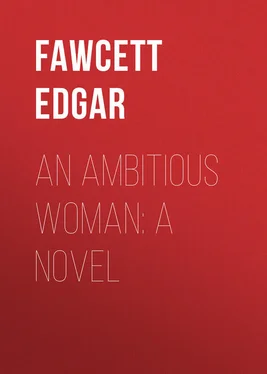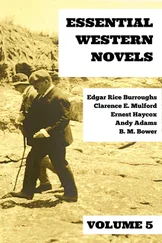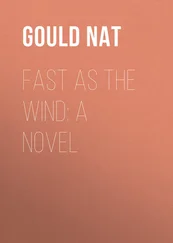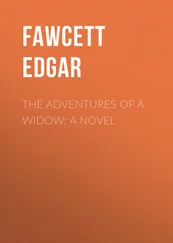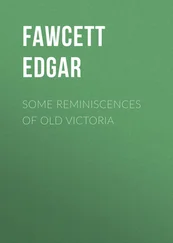Edgar Fawcett - An Ambitious Woman - A Novel
Здесь есть возможность читать онлайн «Edgar Fawcett - An Ambitious Woman - A Novel» — ознакомительный отрывок электронной книги совершенно бесплатно, а после прочтения отрывка купить полную версию. В некоторых случаях можно слушать аудио, скачать через торрент в формате fb2 и присутствует краткое содержание. Жанр: foreign_antique, foreign_prose, на английском языке. Описание произведения, (предисловие) а так же отзывы посетителей доступны на портале библиотеки ЛибКат.
- Название:An Ambitious Woman: A Novel
- Автор:
- Жанр:
- Год:неизвестен
- ISBN:нет данных
- Рейтинг книги:3 / 5. Голосов: 1
-
Избранное:Добавить в избранное
- Отзывы:
-
Ваша оценка:
- 60
- 1
- 2
- 3
- 4
- 5
An Ambitious Woman: A Novel: краткое содержание, описание и аннотация
Предлагаем к чтению аннотацию, описание, краткое содержание или предисловие (зависит от того, что написал сам автор книги «An Ambitious Woman: A Novel»). Если вы не нашли необходимую информацию о книге — напишите в комментариях, мы постараемся отыскать её.
An Ambitious Woman: A Novel — читать онлайн ознакомительный отрывок
Ниже представлен текст книги, разбитый по страницам. Система сохранения места последней прочитанной страницы, позволяет с удобством читать онлайн бесплатно книгу «An Ambitious Woman: A Novel», без необходимости каждый раз заново искать на чём Вы остановились. Поставьте закладку, и сможете в любой момент перейти на страницу, на которой закончили чтение.
Интервал:
Закладка:
Edgar Fawcett
An Ambitious Woman: A Novel
I
If any spot on the globe can be found where even Spring has lost the sweet trick of making herself charming, a cynic in search of an opportunity for some such morose discovery might thank his baleful stars were chance to drift him upon Greenpoint. Whoever named the place in past days must have done so with a double satire; for Greenpoint is not a point, nor is it ever green. Years ago it began by being the sluggish suburb of a thriftier and smarter suburb, Brooklyn. By degrees the latter broadened into a huge city, and soon its neighbor village stretched out to it arms of straggling huts and swampy river-line, in doleful welcome. To-day the affiliation is complete. Man has said let it all be Brooklyn, and it is all Brooklyn. But the sovereign dreariness of Greenpoint, like an unpropitiated god, still remains. Its melancholy, its ugliness, its torpor, its neglect, all preserve an unimpaired novelty. It is very near New York, and yet in atmosphere, suggestion, vitality, it is leagues away. Our noble city, with its magnificent maritime approaches, its mast-thronged docks, its lordly encircling rivers, its majesty of traffic, its gallant avenues of edifices, its loud assertion of life, and its fine promise of riper culture, fades into a dim memory when you have touched, after only a brief voyage, upon this forlorn opposite shore.
No Charon rows you across, though your short trip has too often the most funereal associations. You take passage in a squat little steamboat at either of two eastern ferries, and are lucky if a hearse with its satellite coaches should fail to embark in your company; for, curiously, the one enlivening fact associable with Greenpoint is its close nearness to a famed Roman Catholic cemetery. It is doubtful if the unkempt child wading in the muddy gutter ever turns his frowzy head when these dismal retinues stream past him. They are always streaming past him; they are as much a part of this lazy environ as the big, ghostly geese that saunter across its ill-tended cobblestones, the dirty goats that nibble at the placards on its many dingy fences, or the dull-faced Germans that plod its semi-paven streets. Death, that is always so bitter a commonplace, has here become a glaring triteness. Watched, along the main thoroughfare, from porches of liquor-shops and windows of tenement-houses, death has perhaps gained a sombre popularity with not a few shabby gazers. It rides in state, at a dignified pace; it has followers, too, riding deferentially behind it. Sometimes it has martial music, and the pomp of military escort. Life seldom has any of this, in Greenpoint. It cannot ride, or rarely. It must walk, and strain to keep its strength even for that. One part of it drudges with the needle, fumes over the smoky stove, sighs at the unappeasable baby; another part takes by dawn the little dwarfish ferry-boat, and hies to the great metropolis across the river, returning jaded from labor by nightfall. No wonder, here, if death should seem to possess not merely a mournful importance but a gloomy advantage as well, or if for these toilful townsfolk philosophy had reversed itself, and instead of the paths of glory leading to the grave, it should look as if the grave were forever leading to some sort of peculiar and comfortable glory.
But Greenpoint, like a hardened conscience, still has her repentant surprises. She is not quite a thing of sloth and penury. True, the broad street that leads from steamboat to cemetery is lined with squalid homes, and the mourners who are so incessantly borne along to Calvary must see little else than beer-sellers standing slippered and coatless beside their doorways, or thin, pinched women haggling with the venders of sickly groceries. But elsewhere one may find by-streets lined with low wooden dwellings that hint of neatness and suggest a better grade of living. A yellowish drab prevails as the hue of these houses; they seem all to partake of one period, like certain homogeneous fossils. But they do not breathe of antiquity; they are fanciful with trellised piazzas and other modern embellishments of carpentry; sometimes they possess miniature Corinthian pillars, faded by the trickle of rain between their tawny flutings, as if stirred with the dumb desire to be white and classic. Scant gardens front them, edged with a few yards of ornamental fence. Their high basement windows stare at you from a foundation of brick. They are very prosaic, chiefly from their lame effort to be picturesque; and when you look down toward the river, expecting to feel refreshed by its gleam, you are disheartened at the way in which lumber-yards and sloop-wharves have quite shut any glimpse of it from your eyes.
In one of these two-storied wooden houses, not many years ago, dwelt a family of three people, – a Mr. Francis Twining, his wife, and their only child, a girl, named Claire. Mr. Twining was an Englishman by birth; many years had passed since he first landed on these shores. He had come here nearly penniless, but with proud hopes. He was then only three-and-twenty. He had sprung from a good country family, had been fitted at Eton for Oxford, and had seen one year at the famed University. Then sharp financial disaster had overtaken his father, whose death soon followed. Francis was a younger son, but even to the heir had fallen a shattered patrimony, and to himself merely a slender legacy. With this, confident and undaunted as though it were the purse of Fortunio, Francis had taken voyage for New York. At first he had shown a really splendid energy. Slim of figure, with a pale, womanish face lit by large, soft blue eyes, he gave slight physical sign of force or even will. But though possessed of both, he proved one of those ill-fated beings whom failure never tires of rebuffing. His mental ability was unquestioned; he shrank with sensitive disgust from all vice; he had plenty of ambition, and the instinct of solid industry. Yet, as years passed on, both secured him but meagre recompense for struggle. He had begun his career with a clerkship; now, at fifty-three, he was a clerk still. All his hope had fled; he had undergone bitter heart-burnings; he had striven to solve the problem of his own defeat. Meanwhile its explanation was not difficult. He had a boyish trust in his fellow-creatures that no amount of stern experience seemed to weaken. Chicanery had made him its sport. Five separate times he had been swindled mercilessly by men in whom he had reposed implicit faith. There had lain his rock of ruin: he was always reposing implicit faith in everybody. His life had been one long pathos of over-credulity. He could think, reason, reflect, analyze, but he was incapable of doubting. A fool could have deceived him, and naturally, on repeated occasions, knaves had not found it difficult. At fifty-three his last hard-earned savings had been wormed from him by the last plausible scamp. And now he had accepted himself as the favorite of misfortune; over the glow of his spirit disappointment had cast its dulling spell, like the deep film of ash that sheathes a spent ember. He had now one aim – to keep his wife and child from indigence while he lived, and one despair – that he could not keep them from indigence after he was dead. But his really lovely optimism still remained. He had been essentially amiable and complaisant in all intercourse with his kind, and this quality had not lost a ray of its fine former lustre. With ample excuse for the worst cynic feeling, he continued a gentle yet unconscious philanthropist. There was something piteously sweet in the obstinacy with which he still saw only the bright side of humanity. His delicate person had grown more slim; his rusty clothes hung about him with a mournful looseness; his oval face, worn by worriment, had taken keener lines; but his large blue eyes still kept their liquid sparkle, and kindled in prompt unison with his alert smile. The flaxen growth that had always fringed his lips and chin with cloudy lightness, had now become of a frosty gray. Seen passingly, no one would have called him, as the current phrase goes, a gentleman. His wearied mien forbade the suggestion of leisure, while his broadcloth spoke of long wear and speedy purchase. But a close gaze might have caught the unperished refinement that still clung to him with sad persistence, and was evident in such minor effects of personal detail as a glimpse of cleanly linen about throat and wrist, a cheap yet careful lustre of the often jaded boot, a culture and purity of the hand, or even a choice nicety of the finger-nail.
Читать дальшеИнтервал:
Закладка:
Похожие книги на «An Ambitious Woman: A Novel»
Представляем Вашему вниманию похожие книги на «An Ambitious Woman: A Novel» списком для выбора. Мы отобрали схожую по названию и смыслу литературу в надежде предоставить читателям больше вариантов отыскать новые, интересные, ещё непрочитанные произведения.
Обсуждение, отзывы о книге «An Ambitious Woman: A Novel» и просто собственные мнения читателей. Оставьте ваши комментарии, напишите, что Вы думаете о произведении, его смысле или главных героях. Укажите что конкретно понравилось, а что нет, и почему Вы так считаете.
